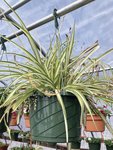



When you open the door to Yard Works Inc. on Warwick Avenue, the smell of flowers, soil and assorted greenery fill the room. Customers may not know it when they walk in, but this store could have some of the cleanest air in the city. According to a NASA study, plants remove 87 percent of toxins from enclosed spaces in a 24-hour period which may benefit individuals’ health.
“Any plant is going to help clean the air,” said Bridget Bugbee, Yard Works Inc. manager of the family-owned landscape business.
Benzene and formaldehyde are two toxins found inside homes and are caused by plastics, resins, synthetic fibers, dyes, detergents, pesticides, building materials, smoke and more. When household plants absorb carbon dioxide through photosynthesis, they take along toxins, according to a study by Wireless Sensor Network in 2018. If individuals breathe in these air pollutants, the American Lung Association said people’s eyes, nose and throat can become irritated. During the process of photosynthesis, plants absorb carbon dioxide and toxins through the pores of their foliage and metabolize it; they then release oxygen in return for humans.
Bugbee said many customers will purchase houseplants during the fall and winter. When the days get shorter and darker, plants can increase people’s moods. As for types of air purifying plants that individuals like, Bugbee knows them by heart.
“Peace lilies, snake plants and pathos are the three most popular houseplants,” Bugbee said.
She said the peace lily is a resilient plant that has a lush look - Bugbee even has one at home. The elegant flower absorbs air pollutants such as benzene, ammonia, trichloroethylene, xylene and formaldehyde. It also prevents mold formation, removes mold spores and absorbs acetone vapors according to an article from Greenkosh. Peace lilies need watering every five to seven days and their average lifespan is three to five years.
Snake plants (which Yard Works Inc. sells along with peace lilies) reduce the “risk of developing allergies and airborne diseases due to their filtration qualities,” according to Clear it Waste Collection. This plant thrives in areas with little and lots of light and lasts five to 10 years.
Pothos is the perfect plant for anyone who doesn’t have a green thumb. According to Clear it Waste Collection, this plant requires minimal watering, little sunlight and eliminates formaldehyde, benzene and toluene from the air. Pet owners may want to stay away from this plant since it harbors toxins that are harmful to dogs and cats. Pothos can live up to ten years if properly cared for and should be watered once a week in warmer months and every two weeks during colder months.
Bugbee mentioned that succulent plants or cacti are great options for individuals who have trouble keeping plants alive.
As for hanging plants or one that could be used in a terrarium, Bugbee suggested spider plants. According to a Gardenine article, spider plants “remove up to 95% of toxins commonly found in homes like fuming solvents, benzene, trichloroethylene, xylenes and ammonia.” The plant thrives in brightly lit places and also increases humidity within the home and lasts 50+ years if properly cared for.
As for maintaining a plant’s health, Bugbee said 90 percent of the time, people kill house plants through overwatering. The best rule to follow is to stick your finger in the soil, and if it comes back dirty, the plant has enough moisture.
Additionally, one misconception people have is that these plants need to be right in a sunny window. However, when these plants are grown in the tropics, they are usually part of the underbrush and thrive in bright and indirect sunlight.
While the end of winter may not be the prime season for purchasing houseplants, research shows they do wonders for removing toxins from the home. And what better way to start your spring cleaning than with some fresh air inside your home.
Comments
No comments on this item Please log in to comment by clicking here